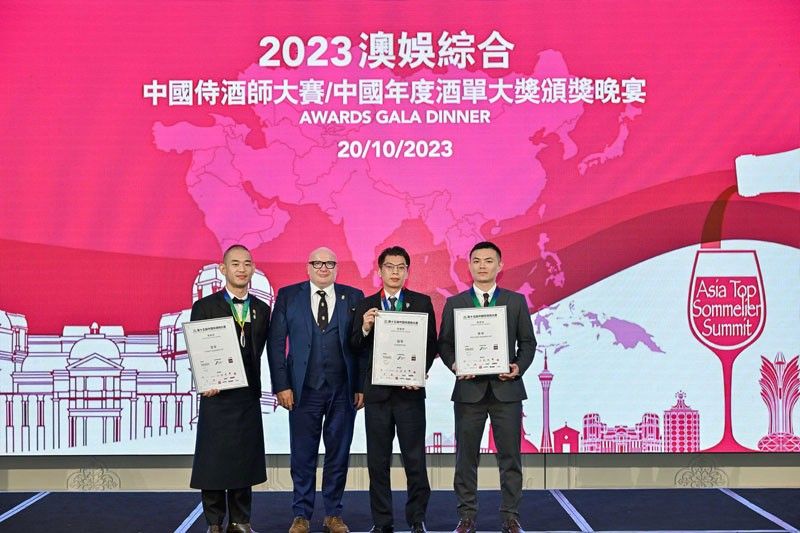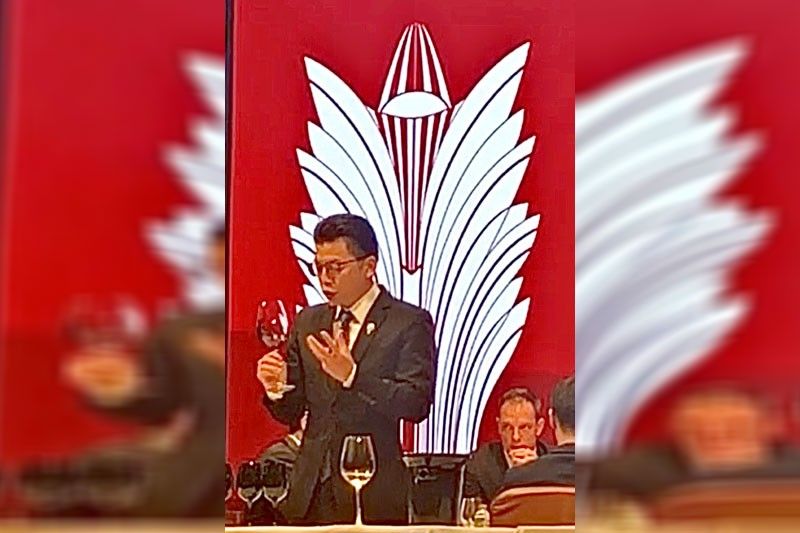Speaking of wines

The China Sommelier Competition held in Macau can be as exciting as ‘Sherlock’ crossed with ‘Drops of God.’
Three dining tables. One serving table. Twelve guests.
The challenge: complete five tasks to perfection and prove you are China’s top sommelier.
This is the scene in Macau’s Grand Lisboa Hotel, where the drama of the 15th China Sommelier Competition unfolds across nearly four hours: Chinese semifinalists Karl Muo, Henry Wu and Yonex Zhang each taking turns performing their challenges — pairing the right wine from the right region with the right dish, spotting 10 mistakes in a printed wine list, identifying specific vineyards and winemakers flashed onscreen, and creating an instant cocktail with selected ingredients. Then comes the “blind tasting”: describing each of five wines served in glasses, down to its fruits and notes, its country, even its vineyard.

Like Drops of God, the manga-inspired Apple+ series about French and Japanese wine experts battling it out for an inheritance, the tension is palpable. The only thing missing is Top Chef strings zinging as the contestants sweat it out; instead, onstage at the Grand Ballroom, you can hear a pin drop.
I’m here with Philippine Sommelier Association (PSA)’s Eric and Charmaine Wang and Filipino sommelier champion Ian Santos (he won top prize in the “Professional” category at the 3rd Annual Philippine Sommelier Competition in 2019 in Thailand) to observe the heated competition — part of three days of wine experiences and tastings sponsored by SJM Group and Asia Wine Institute — all culminating in a gala night to unveil China’s Wine List of the Year Awards, as well as naming a top sommelier among the three semifinalists.
“It is exciting,” says Asia Wine Institute founder and head Tommy Lam, looking over a sea of sommeliers in the crowd like a proud papa. “This peninsula has never been graced by so many champion sommeliers.”

This is the first time the event has been held in Macau, a casino mecca built on a peninsula where it is possible to spot both Hong Kong and Mainland China on the horizon. Whatever initial vision of Casino Heaven dreamt up by Las Vegas, Macau has expanded that to a multiverse of high-end resorts, splashy gaming centers and multi-tiered luxury hotels designed by the likes of Versace and Karl Lagerfeld, mainly servicing the surrounding Chinese clientele.
Onstage the finalists, one by one, sample the wines and interject taste adjectives (“pears… peaches…”) as they try to narrow things down, somewhat like Sherlock Holmes, deducing the essence of each glass. It takes great precision. “This is where everybody has a hard time,” says Ian of the blind tasting. “You have no idea about the wine, but you have to precisely describe it, and it’s how you describe it. It’s really how you think versus aroma.”
So why are sommeliers so important? Everybody in Manila has had a wine-pairing menu or a meal made extra special by the careful selection of bottles, and the stories that go with them. There’s an ineffable quality to good service, and that’s partly why Eric and Charmaine Wang promote the PSA so strongly.
The other part is money. As Rob Hirst, founder of the Wine List Awards, explains, “From a business perspective, the sellers behind a great wine list are the second biggest investment a restaurant ever makes. This is a key part of the sommelier’s role: creating and managing a great wine list.”
Charmaine adds: “Restaurants in the Philippines don’t really realize the value of a great beverage program — how it can maybe double or triple their food revenues. If you have a good sommelier that can sell the wine, talk about the stories behind the wine, that’s a huge bonus for the restaurant. The sommelier pays for itself.”
The non-profit PSA holds wine seminars, lectures and trainings so that local sommeliers can compete on the world stage. The membership fees are minimal, but training and certification can earn you double the salary of a mere server, usually with commissions from sales as well. The bigger certification body is the international Association de la Sommelerie Internationale (ASI).
Onstage, all three Chinese finalists line up for the last task: evenly pouring a magnum of champagne into 16 flutes within eight minutes. You feel there should be a drumroll: each sommelier pulls out a waiter’s corkscrew (“It’s the only object they’re allowed to bring onstage in competition,” notes Eric) and opens their bottle; some stoop down to table level to get each drop just right.
In the end, it’s Henry Wu who wins this final challenge, and sure enough, the next night he bags the top sommelier prize (with 163 points) at an awarding ceremony held at Grand Lisboa Palace Resorts, which also features a spectacular dinner followed by the China’s Wine List of the Year Awards, and even a special SOMM100 Graduation Ceremony, in which Tommy Lam led his 100 elementary-level sommelier graduates in singing their school song onstage. Mr. Lam, there from the beginning of Asia Wine Institute in 2010, also announced he would be stepping back to take care of his wife at this time. He was warmly applauded for his role in building up the ranks of sommeliers. “Without Tommy Lam, we master sommeliers wouldn’t be here,” noted Master Sommelier Brian Gulyun. “Sommeilery wasn’t considered a profession, and most restaurants didn't see the need.”
Our three days in Macau included a roster of great and new wines. Master Sommelier João Pires introduced Long Dai wineries in Shanding province, a place owned by Château Lafite Rothschild where everybody on staff speaks both Chinese and French. Wine reps from Southeast Asia held an “Asian Wine Market Dialogue” to discuss their country’s numbers and possible futures (Eric noted the Philippines is a hard read for wine data due to “informal” importing and lengthy product registration.) We tasted Portuguese wines on welcoming night, and the next day sampled some 130 wines from 32 competing Chinese wineries, where Ningxai is emerging in the mountainous north as a solid producer, called by some the “Bordeaux of China.” Many of those bottles bagged Wine List Awards trophies during gala night.
Mostly, I got to see the camaraderie of sommeliers: it’s a brotherhood of sorts, though a number of female sommeliers now join the ranks. Most nights they would hang out in Macau’s restaurants after the day’s events, because there’s always one more special wine, one more bottle that needs to be shared with somebody.
* * *
Thanks to the Philippine Sommelier Association’s Eric and Charmaine Wang, Asia Wine Institute and SMJ Resorts for sponsoring our trip.
Visit PSA on Facebook (www.facebook.com/sommPH/) and check out Manila Uncorked 2023 on Nov. 7 held at Enderun Tent, Taguig.



















